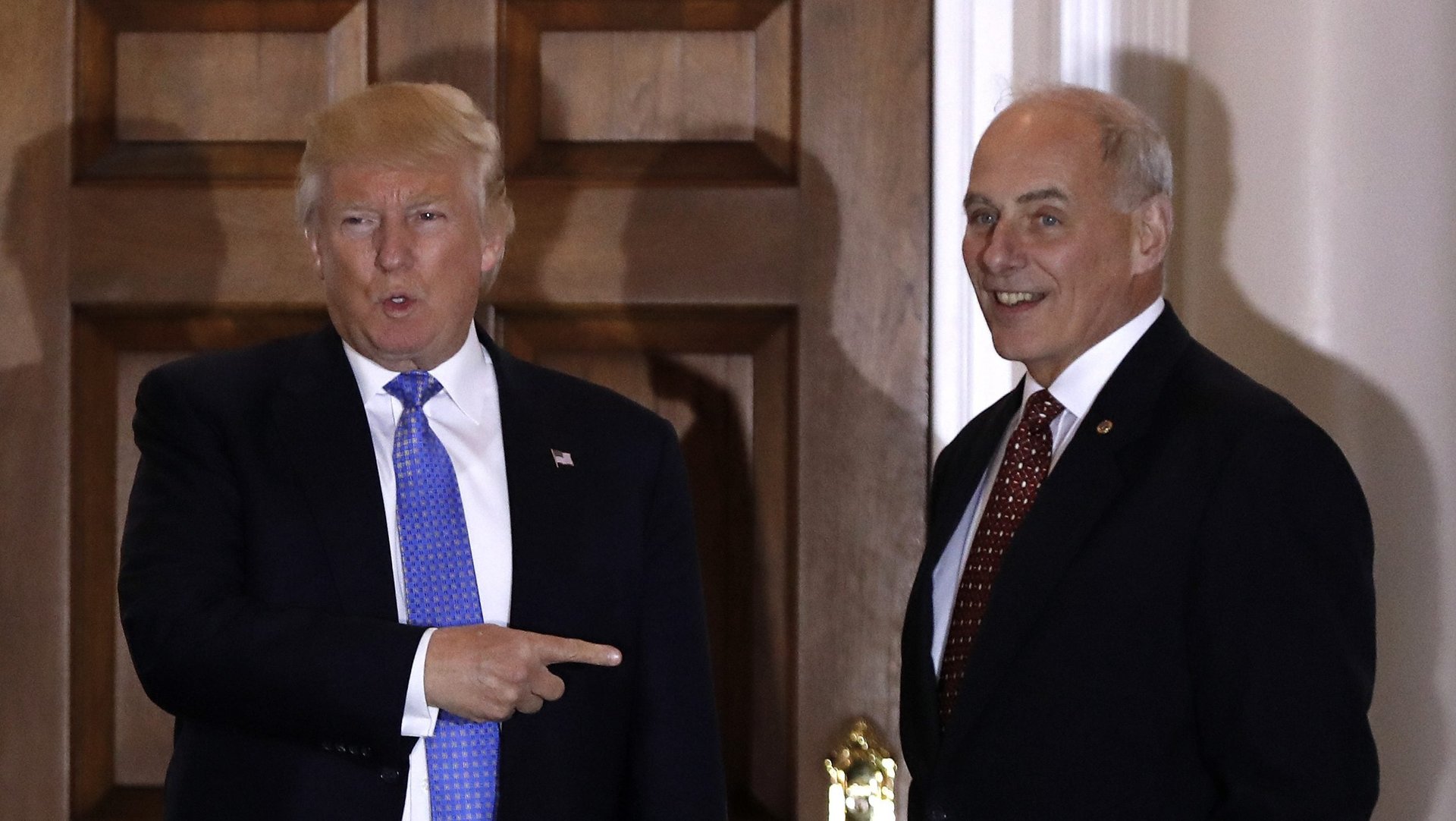How did John Kelly get the White House chief of staff job? By being a good soldier
On the face of it, John Kelly’s new job as White House chief of staff looks easier than the one he’s held as US president Donald Trump’s Homeland Security secretary. For starters, the retired Marine general will be managing 377 staffers instead of the 240,000 he has overseen at the Department of Homeland Security. But the stories of vicious power struggles within the Trump White House suggest the job could be much tougher. Combat experience might prove handy.


On the face of it, John Kelly’s new job as White House chief of staff looks easier than the one he’s held as US president Donald Trump’s Homeland Security secretary. For starters, the retired Marine general will be managing 377 staffers instead of the 240,000 he has overseen at the Department of Homeland Security. But the stories of vicious power struggles within the Trump White House suggest the job could be much tougher. Combat experience might prove handy.
Kelly, who has a reputation for speaking truth to power and holding informed and nuanced views, is taking over the role from former Republican National Committee head Reince Priebus, who seemed incapable of reining in his mercurial boss. But those who think a level-headed career soldier will be any better at controlling Trump’s impulses should look at Kelly’s record in his first cabinet post. If he’s been a moderating influence on Trump while at Homeland Security, there’s little public evidence of it.
So far, the role he’s played can be summed up as that of a good soldier.
High hopes
Back in January, Kelly’s confirmation came as a relief to many who had been alarmed by Trump’s demonizing immigration talk. At the time, Kelly’s own assessment on the issue and how to address it—informed no doubt by his experience as head of the US Southern Command, when he oversaw US security operations in Central America—appeared to be decidedly more enlightened than that of his new boss.
Unlike Trump, who had been singularly focused on building a wall, Kelly proposed on-the-ground assistance to boost Central American economies and make people safer. He identified the region’s brutal violence as a big driver for immigration, in contrast to the popular view among Republicans that the main reason Central Americans come to the US is the simple expectation that they can stay.
Regional experts say that while serving in the Southern Command post, Kelly developed close ties with political, military, and corporate elites in the Northern Triangle, made up of Guatemala, Honduras, and El Salvador.
“He knows the region well,” said Christian Calderón, a professor at Guatemala’s San Carlos University. “He knows what he’s talking about.”
He’s also shown himself to be sympathetic to immigrants’ plight, saying during his Senate hearing that the US shares in the blame of the brutal crime that is chasing them out of their countries.
“It’s a tough, tough problem and it comes back to the incredible profits that flow out of our country because of the use of drugs,” he said about the violence south of the border. “The average American who uses drugs recreationally doesn’t think there’s anything wrong with it. The Latins will tell you because of your recreational use, or your abuse, thousands and thousands of Latins die every year that shouldn’t die.”
Kelly had a reputation for being similarly frank with Central American leaders about their own shortcomings. In private, Kelly criticized “the short-term vision of these elites and their meager commitment to the development of their countries,” according to Edgar Gutiérrez, an analyst and former foreign minister of Guatemala.
Yes, sir
It’s unclear whether, or how much, Kelly questioned Trump’s policies in private once he became Homeland Security secretary. In public, he’s been trying to follow them to the letter—even when the mission has been primed for failure. The chaotic implementation of Trump’s executive order to bar travelers from seven largely Muslim countries is an example of that. Kelly, who was reportedly informed of Trump’s intention to order the travel ban at the last minute, not only promptly rolled out the ban, but later blamed himself for not doing it more thoughtfully.
One by one, he’s been checking off the items in Trump’s other executive orders on immigration, including widening the scope of immigrants who are considered a priority for deportation and opening a federal office to help the victims of crimes committed by undocumented immigrants to the US.
To be sure, Kelly had his own strong views about border security before he was confirmed, referring to the international boundary between the US and Mexico as a mere “speed bump” and “porous.” During his confirmation hearing, Kelly repeatedly referred to his commitment to following the law—which in the context of immigration is often shorthand for deporting people who are in the country illegally.
“General John Kelly is one of the true stars of the Administration,” the White House said in a statement. “The entire Administration loves him and no one is comparable.”
In his own statement about the news, Kelly simply said he was honored to serve.